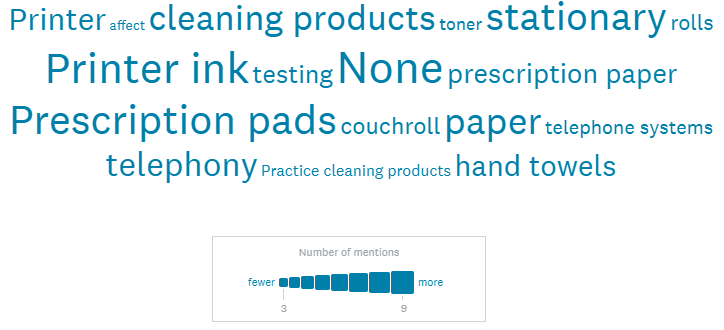EU Exit Planning: Non-Clinical Goods and Services
![]() Thank you for responding to our recent survey on practice needs in the event of a no-deal Brexit. We rely on your input.
Thank you for responding to our recent survey on practice needs in the event of a no-deal Brexit. We rely on your input.
Following a discussion at our Annual General Meeting on Thursday 24 January, we asked you about the impact of a no-deal EU exit on your practice-critical Non-Clinical Goods and Services (NCGS). Medical devices, clinical consumables and medicines are being considered separately.
We asked you to consider:
- The dependency of those goods/ services on that front-line service;
- The criticality of that front-line service and its clinical importance; and
- Outsourced services such as equipment maintenance.
We had a really good response and have been able to advise officials about supply concerns across London in good time. Whilst there were a number of respondents who are unconcerned about the impact of no-deal Brexit, those who do harbour concerns highlighted a number of non clinical products and services which they fear might be affected. These include:
- Stationary;
- Printer ink;
- Prescription pads;
- Couch roll;
- Paper;
- Telephony;
- Cleaning products;
- Prescription paper;
- Printer;
- Hand towels;
- Testing;
- Telephone systems;
- Practice cleaning products; and
- Toner.
We will continue to work with officials to identify and anticipate the impact of Brexit on London general practice, be it no-deal or otherwise. Other possible EU exit risks include:
- Goods or services that have supply chain touch points in the EU;
- Personal data held in EU member countries;
- Supply routes into the UK via Dover/ Calais; and
- Dependencies on EU regulations.
If you have any comments or questions about this work, please contact us.
This word cloud gives some indication of respondents' concerns.

NHS England and Improvement MMR campaign (22 Jan 2020)
The most recent update to the GP contract added the responsibility for practices to participate in six NHS England and Improvement public health campaigns each year. The first of these...Help us shape our new website (22 Jan 2020)
We know how important a good website is in communicating with our GPs and practice teams. Our current site has been around for several years and we would need your...LMC elections 2020 – make your voice heard (22 Jan 2020)
It’s LMC election time again at Londonwide LMCs! This year every LMC seat is up for election. Any GP working in one of the 27 London boroughs we represent may...Understanding the workload implications of two new PCN DES Service Specifications (22 Jan 2020)
Londonwide LMCs’ Medical Director Dr Elliott Singer has modelled possible workload requirement and resulting PCN liability for two of the new service specifications. His modelling reveals that the resources required...New PCSE online service for Performers List (22 Jan 2020)
The new Primary Care Support England (PCSE) online service for submitting Performers List (PL) applications and changes replaces the old paper forms and is now live. The BMA’s General Practitioners...Exciting opportunity for practice managers (22 Jan 2020)
For a limited period only, we are pleased to be able to offer you a unique career development opportunity, that’s fully funded for practice managers or those aspiring to the...Flu guidance for Autumn 2020 (22 Jan 2020)
NHS England have updated their advice to practices regarding which types of flu vaccine should be ordered for use during the next vaccination season. Full details of NHS England’s...PCN DES Outline Specifications consultation and costings update (22 Jan 2020)
Thanks for your input and support with the recent PCN DES Specifications consultation. The numbers speak for themselves. The overwhelming mood is one of frustration with loudly voiced opposition and...Londonwide LMCs' January 2020 Newsletter (22 Jan 2020)
...Guidance
We provide expert guidance for practices in our guidance section, as well as an archive of other materials you may find useful.
GP Support
Contact our GP Support team if you need help or advice.
The team provide professional and pastoral support to GPs and practice teams on a broad range of issues.

